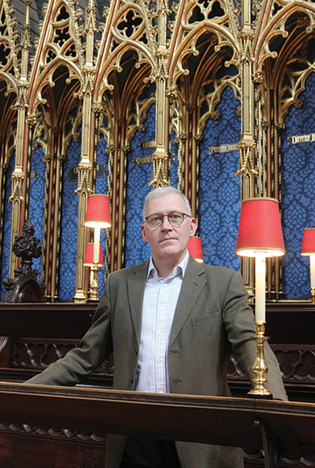
Suzanne Bosman
James O’Donnell, shown here standing in the choir stalls of Westminster Abbey, was the Abbey’s director of music for 23 years.
View full image
James O’Donnell has come to New Haven so he can stay connected to the world. In January, he joined the faculties of both the Yale School of Music and the Institute of Sacred Music (ISM) after spending more than 20 years as the director of music at Westminster Abbey. One of his last duties in that role was leading the music for the funeral of Queen Elizabeth II, which was likely witnessed by billions of people around the world. And while moments of that magnitude are rare, he expects his time at Yale will be no less connected to the culture at large.
“Yale is a world institution,” he says. “It’s outward-looking. It’s offering itself to the world, and I find that very freeing.” That expansiveness is reflected not only in his own work—which includes ongoing performances as a world-class organist—but also in his approach to teaching. As he trains graduate majors in organ, he’ll be working not only to develop their individual talents, but also to encourage their lives outside the rehearsal room. “I think it’s very important for an artist to have a wide bandwidth, as we would say now, rather than be over-focused on one thing,” he says. “An organist should look at paintings and read the newspaper and know which movies are on. I think that one’s work is enlivened by a breadth of interests.”
O’Donnell’s colleagues are struck by this enthusiasm for knowledge. “He’s a very open and enthusiastic man, which is just so important for being a good teacher,” says Walden Moore ’80MusM, director of music at New Haven’s Trinity on the Green, who teaches organ at ISM. “His expertise and energy will be incredibly important. You see James coming from the English, Anglican tradition, and you have [ISM director] Martin Jean coming from the American, Lutheran tradition. There are enough differences there that they’ll approach things slightly differently. They’ll be at complementary angles, and that will just expand the conversation for everyone.”
Still, O’Donnell balances his expansive approach with periods of incredible focus. Even when he was conducting the choir at the queen’s funeral, he had to forget that the entire planet was listening. “When you’re actually doing the work, all you think about is what you’re doing with the choir,” he says. “You may be aware of all the other contexts—the national moment and those things—but you do the work.
My role in that funeral was to enable the choir to reach the pitch of performance that we’d worked toward. When you think about it in a more detached way, you can reflect on what an extraordinary event it was, but when you’re in the middle of it, you’re in the eye of a storm.”
That perspective will inform O’Donnell’s daily practice at Yale, as well as what he teaches his students. “It’s not a question of waiting for something big to come along and then finally deciding to do your job properly,” he says. “If you are in the habit of going about what you do—day by day—with integrity and with attention, then when these momentous episodes do come, you’re equipped to deal with them.”
 loading
loading